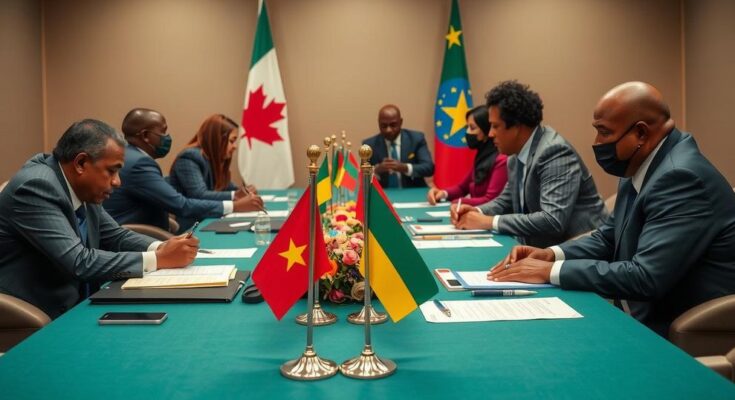The African Union urges Somalia and Ethiopia to implement a key agreement aimed at addressing Ethiopia’s sea access issue following tensions from a deal with Somaliland. The agreement, facilitated by Turkey, emphasizes collaborative efforts for mutual prosperity and highlights the challenge of addressing Ethiopia’s prior arrangements with Somaliland.
The African Union (AU) has encouraged both Somalia and Ethiopia to swiftly implement a pivotal agreement focused on reducing tensions regarding Ethiopia’s request for maritime access. AU Commission Chairman Moussa Faki Mahamat underscored the agreement as a crucial initiative and emphasized the urgency of taking immediate action to reinforce this resolution.
Tensions between Somalia and Ethiopia escalated earlier this year after Ethiopia entered into a contentious agreement with Somaliland, a self-declared autonomous region of Somalia, to lease coastlines for a port and military base. This agreement also implied Ethiopia’s potential recognition of Somaliland’s independence, a move that triggered strong opposition from Somalia, which asserted violations of its sovereignty.
The recently concluded negotiations, facilitated by Turkey, resulted in what was termed a “historic” agreement. Turkish President Recep Tayyip Erdoğan heralded the accord as a meaningful advancement toward granting Ethiopia, which has been landlocked since Eritrea’s separation in 1993, access to the sea. The agreement, published by Turkey, obligates both nations to amicably resolve their differences and collaborate for mutual prosperity, with plans for technical discussions on commercial and bilateral arrangements ensuring Ethiopia’s “reliable, safe, and sustainable” sea access while honoring Somalia’s sovereignty.
Starting in February, these discussions are anticipated to conclude within a span of four months, with Turkey offering mediation as necessary. Nonetheless, the situation regarding Ethiopia’s independent agreement with Somaliland remains somewhat ambiguous. A source within Somaliland’s government indicated that the new agreement does not nullify the prior memorandum of understanding.
The African Union and the Intergovernmental Authority on Development (IGAD) have welcomed this agreement as a significant move towards reconciling bilateral disputes. IGAD Executive Secretary Workneh Gebeyehu praised the accord as a testament to the nations’ commitment to peacefully resolving their differences. Somali President Hassan Sheikh Mohamud articulated the necessity of peace and cooperation in the region, while Ethiopian Prime Minister Abiy Ahmed reaffirmed his country’s quest for coastal access but denied any intentions of pursuing conflict regarding the matter.
This agreement marks a pivotal juncture in Ethiopia-Somalia relations, yet it also raises important questions concerning Ethiopia’s previous arrangements with Somaliland. Both nations are now faced with the imperative of transforming this diplomatic achievement into effective and sustainable action.
The situation between Somalia and Ethiopia has long been fraught with territorial and diplomatic challenges. Historically, Ethiopia, being a landlocked country, has sought access to the sea for trade and economic development. The emergence of Somaliland, which declared independence from Somalia, complicates this issue, as Ethiopia has interests in engaging with the region. The tensions escalated when Ethiopia signed a controversial deal with Somaliland, prompting Somalia to assert its sovereignty. The recent diplomatic negotiations, mediated by Turkey, represent an effort to stabilize relations and address these complex dynamics.
In summary, the African Union’s call to action regarding the recent Somalia-Ethiopia agreement highlights a significant diplomatic milestone aimed at reducing regional tensions. The agreement not only seeks to provide Ethiopia with necessary maritime access but also underscores the importance of maintaining Somalia’s sovereignty. As both nations embark on discussions set to begin shortly, the international community will be observing closely, eager to see whether this diplomatic initiative can lead to lasting peace and cooperation in the region.
Original Source: newscentral.africa




